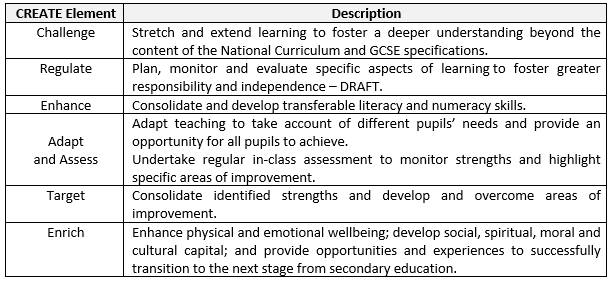Curriculum
CREATE Curriculum
The CREATE Curriculum is a bespoke curriculum designed to bring together the key interrelated aspects of curriculum structure, design and delivery into a single coherent entity.
CREATE focuses on the following key elements:

CREATE Curriculum Schemes
- Click here for Art and Design
- Click here for Business Studies
- Click here for Citizenship
- Click here for Computing
- Click here for Drama
- Click here for English
- Click here for Food Preparation
- Click here for French
- Click here for Geography
- Click here for History
- Click here for Mathematics
- Click here for Music
- Click here for RE
- Click here for Science
- Click here for Sociology
- Click here for Statistics
Key Stage 3 Indicative Competencies
In 2013, the DfE confirmed that National Curriculum (NC) levels would be removed. Schools were subsequently given the challenge/autonomy to implement their own assessment arrangements.
In 2014, the DfE introduced a phased transition from alphabetical (A*-G) to numerical (9-1) grades at Key Stage 4 (KS4). The Academy therefore developed a mirrored grading system at Key Stage 3 (KS3) within a set of subject-specific ‘indicative competencies’.
Key Stage 4 Curriculum Pathways Information
Year 9 parents were invited to an Information Evening on 29th April which included an introduction to the Options process.
Click here for the Year 9 Parent Information Evening Presentation
The personalised pathway is arranged into three blocks. Pupil select one subject from each.
Block A - Humanities
Geography
History
Block 2 - Design and Technology
Computer Science
Business Studies
Creative iMedia
Design Technology
Food Preparation
Statistics
Block 3 - Arts
Art
Drama
Music
PE
RE
Sociology
Click here for the Curriculum Pathways Booklet
Click here for DfE Guide to the EBacc
Click here for Where can your option choices take you? | My World of Work
Marking and Feedback : meaningful, manageable, motivating.
At The Eastwood Academy we believe that the sole focus of marking and feedback should be to further a pupil’s learning. Constructive feedback – written and verbal, enables pupils to become reflective learners, helping them to close the gap between what they currently ACHIEVE and what we would like them to ACHIEVE.
We recognise the importance of feedback as part of the teaching & learning cycle and aim to maximise the effectiveness of its use in practice, thereby moving the pupils’ learning forward.
We work in a planned and focused way to ensure that:
• teachers are able to gather feedback that enables them to adjust their teaching across a sequence of lessons.
• pupils receive timely and purposeful feedback that supports progress
At The Eastwood Academy, we know that verbal, 'in the moment' feedback has the greatest impact on pupil learning.
When you look at your child’s work in their books, you will notice that they are not marked in a traditional format. This is because the school, similar to many other secondary schools, uses a "whole class feedback” model.
Why are you doing “whole class feedback” and not marking my child’s book individually?
The most up to date research shows that traditional marking has very little impact on a pupil’s progress. Most of the time, comments aren’t read by the pupil or they are not acted upon. This means teachers spend lots of time, and effort, for very little gain.
This approach allows teachers more time to plan the next steps for individual pupils and deliver more personalised lessons. Teachers will still look at every book regularly, but they will be making general notes as to who needs what next, rather than individual, lengthy comments in individual books.
Does this mean my child’s teacher will never tick a book again?
No. If teachers still wish to make quick comments in a pupil’s book about something fantastic or in need of attention, they may still do that. Remember, they are still looking at each book regularly, just not necessarily writing comments in it. Teachers use marking symbols which are known and understood by the children.
Is this possible with 30 pupils in a class?
Yes, because even though each pupil is an individual, many of them will have similar strengths and weaknesses with a topic or lesson. Those pupils can then be taught the next step together in the next lesson in the sequence. Pupils who have specific learning needs will be noted and then a staff member will work with the child to address any areas of difficulty.
What about pupils who always get things right?
If they are being challenged, they shouldn’t find their work easy. Teachers will make notes to plan the next steps to ensure each pupil is challenged.
What about pupils who always get things wrong?
If the teacher is pitching the work correctly, it should be challenging but within their capabilities.
My child thrives on knowing how well they did in a task. How will the teachers communicate this to them?
At the beginning of each lesson, we recap previous learning, as this is how we learn best. During this part of the lesson, teachers give whole class feedback. They might show pupils good examples of work by putting it up on the screen or discuss common errors and misconceptions whilst pupils are looking back at their work to address any mistakes.
This skill is far more important for pupils learning, rather than the teacher telling them. This is also when pupils will receive praise for their efforts, publicly or privately, depending on the child. Each teacher will know the best way to do this.
What does the feedback look like?
It is a sheet of notes or a proforma that the teacher will use when they are checking the books. The whole time the teacher is looking back at a book, they are considering the next learning steps for each child and making notes accordingly.
These notes are completed to enable every child to make progress by matching the next learning step to the needs of each child.
What should I look for in my child’s book then?
Look for their own corrections - usually in green pen. Look for something they get wrong one day, then right the next day or following week. Look at the marking symbols and ask your child or your child's teacher to explain what they mean.
Your children should be able to tell you what they need to work on next because they will check for themselves and think about their own next steps within independent tasks.

